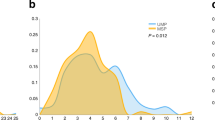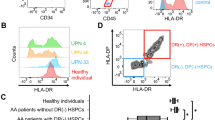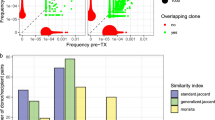Abstract
Minor histocompatibility antigens (mHags) are polymorphic peptides presented to T lymphocytes restricted by the MHC molecule. It has been reported that disparities of mHags are a potential risk factor for GVHD after hematopoietic SCT (HSCT). Here we observed allelic frequencies of HA-1, -2 and -8 in 139 Korean healthy individuals using PCR-sequence-specific primers, and analyzed the correlation between disparity of these mHags and acute GVHD (aGVHD) in 54 patients who underwent HSCT from unrelated HLA-identical donors. The allelic frequencies in Korean healthy individuals were 39.6 and 60.4% for HA-1H and HA-1R, 92.4 and 7.6% for HA-2M and HA-2V, 36.7 and 63.3% for HA-8R and HA-8P, respectively. The frequencies of mHags incompatibility known to be associated with aGVHD were 16.7% in HA-1, 0% in HA-2 and 25.9% in HA-8. However, the statistically significant association of aGVHD with these mHags incompatibility was not found between healthy donors and leukemia patients after unrelated HSCT. This first report about mHags in Koreans may be helpful in further defining the clinical impact of mHags disparities in HSCT and in comparing with other populations.
This is a preview of subscription content, access via your institution
Access options
Subscribe to this journal
Receive 12 print issues and online access
$259.00 per year
only $21.58 per issue
Buy this article
- Purchase on Springer Link
- Instant access to full article PDF
Prices may be subject to local taxes which are calculated during checkout

Similar content being viewed by others
References
Mullighan C, Heatley S, Doherty K, Szabo F, Grigg A, Hughes T et al. Non-HLA immunogenetic polymorphisms and the risk of complications after allogeneic hemopoietic stem-cell transplantation. Transplantation 2004; 77: 587–596.
Spierings E, Wieles B, Goulmy E . Minor histocompatibility antigens—big in tumor therapy. Trends Immunol 2004; 25: 56–60.
Goulmy E, Termijtelen A, Bradley BA, van Rood JJ . Alloimmunity to human H-Y. Lancet 1976; 2: 1206.
Goulmy E, Schipper R, Pool J, Blokland E, Falkenburg JH, Vossen J et al. Mismatches for minor histocompatibility antigens between HLA-identical donors and recipients and the development of graft versus host disease after bone marrow transplantation. N Engl J 1996; 334: 281–285.
Warren EH, Gavin M, Greenberg PD, Riddell SR . Minor histocompatibility antigens as targets for T-cell therapy after bone marrow transplantation. Curr Opin Hematol 1998; 5: 429–433.
Akatsuka Y, Warren EH, Gooley TA, Brickner AG, Lin MT, Hansen JA et al. Disparity for a newly identified minor histocompatibility antigen, HA-8, correlates with acute graft-versus-host disease after haematopoietic stem cell transplantation from an HLA-identical sibling. Br J Haematol 2003; 123: 671–675.
den Haan JM, Meadows LM, Wang W, Pool J, Blokland E, Bishop TL et al. The minor histocompatibility antigen HA-1: a diallelic gene with a single amino acid polymorphism. Science 1998; 279: 1054–1057.
Mommaas B, Kamp J, Drijfhout JW, Beekman N, Ossendorp F, Van Veelen P et al. Identification of a novel HLA-B60-restricted T cell epitope of the minor histocompatibility antigen HA-1 Locus. J Immunol 2002; 169: 3131–3136.
Pierce RA, Field ED, Mutis T, Golovina TN, Von Kap-Herr C, Wilke M et al. The HA-2 minor histocompatibility antigen is derived from a diallelic gene encoding a novel human class I myosin protein. J Immunol 2001; 167: 3223–3230.
Brickner AG, Warren EH, Caldwell JA, Akatsuka Y, Golovina TN, Zarling AL et al. The immunogenicity of a new human minor histocompatibility antigen results from differential antigen processing. J Exp Med 2001; 193: 195–206.
Bunce M, O'Neill CM, Barnardo MC, Krausa P, Browning MJ, Morris PJ et al. Phototyping: comprehensive DNA typing for HLA-A, B, C, DRB1, DRB3, DRB4, DRB5 & DQB1 by PCR with 144 primer mixes utilizing sequence-specific primers (PCR-SSP). Tissue Antigens 1995; 46: 355–367.
Murata M, Emi N, Hirabayashi N, Hamaguchi M, Goto S, Wakita A et al. No significant association between HA-1 incompatibility and incidence of acute graft-versus-host disease after HLA-identical sibling bone marrow transplantation in Japanese patients. Int J Hematol 2000; 72: 371–375.
Pietz BC, Warden MB, DuChateau BK, Ellis TM . Multiplex genotyping of human minor histocompatibility antigens. Hum Immunol 2005; 66: 1174–1182.
Arostegui JI, Gallardo D, Rodriguez-Luaces M, Querol S, Madrigal JA, Garcia-Lopez J et al. Genomic typing of minor histocompatibility antigen HA-1 by reference strand mediated conformation analysis (RSCA). Tissue Antigens 2000; 56: 69–76.
Di Terlizzi S, Zino E, Mazzi B, Magnani C, Tresoldi C, Perna SK et al. Therapeutic and diagnostic applications of minor histocompatibility antigen HA-1 and HA-2 disparities in allogeneic hematopoietic stem cell transplantation: a survey of different populations. Biol Blood Marrow Transplant 2006; 12: 95–101.
Marijt WA, Heemskerk MH, Kloosterboer FM, Goulmy E, Kester MG, van der Hoorn MA et al. Hematopoiesis-restricted minor histocompatibility antigens HA-1- or HA-2-specific T cells can induce complete remissions of relapsed leukemia. Proc Natl Acad Sci USA 2003; 100: 2742–2747.
Spierings E, Goulmy E . Expanding the immunotherapeutic potential of minor histocompatibility antigens. J Clin Invest 2005; 115: 3397–3400.
Gallardo D, Arostegui JI, Balas A, Torres A, Caballero D, Carreras E et al. Disparity for the minor histocompatibility antigen HA-1 is associated with an increased risk of acute graft-versus-host disease (GvHD) but it does not affect chronic GvHD incidence, disease-free survival or overall survival after allogeneic human leucocyte antigen-identical sibling donor transplantation. Br J Haematol 2001; 114: 931–936.
Choi HB, Kim TG, Chung TJ, Han H . The distribution of HLA-A*02 subtype in Koreans. Korean J Immunol 1998; 20: 31–37.
Del Guercio MF, Sidney J, Hermanson G, Perez C, Grey HM, Kubo RT et al. Binding of a peptide antigen to multiple HLA alleles allows definition of an A2-like supertype. J Immunol 1995; 154: 685–693.
Nesci S, Buffi O, Iliescu A, Andreani M, Lucarelli G . Recipient mHag–HA1 disparity and aGVHD in thalassemic-transplanted patients. Bone Marrow Transplant 2003; 31: 575–578.
Tseng LH, Lin MT, Hansen JA, Gooley T, Pei J, Smith AG et al. Correlation between disparity for the minor histocompatibility antigen HA-1 and the development of acute graft-versus-host disease after allogeneic marrow transplantation. Blood 1999; 94: 2911–2914.
Rufer N, Wolpert E, Helg C, Tiercy JM, Gratwohl A, Chapuis B et al. HA-1 and the SMCY-derived peptide FIDSYICQV (H-Y) are immunodominant minor histocompatibility antigens after bone marrow transplantation. Transplantation 1998; 66: 910–916.
Acknowledgements
This study was supported by a grant of the Korea Health 21 R&D Project, Ministry of Health & Welfare, Republic of Korea (01-PJ10-PG6-01GN16-0005).
Author information
Authors and Affiliations
Corresponding author
Rights and permissions
About this article
Cite this article
Park, MJ., Choi, HB., Jang, JP. et al. Distribution of the minor histocompatibility antigens in Korean population and disparities in unrelated hematopoietic SCT. Bone Marrow Transplant 40, 723–728 (2007). https://doi.org/10.1038/sj.bmt.1705808
Received:
Revised:
Accepted:
Published:
Issue Date:
DOI: https://doi.org/10.1038/sj.bmt.1705808
Keywords
This article is cited by
-
Immunogenic disparities of 11 minor histocompatibility antigens (mHAs) in HLA-matched unrelated allogeneic hematopoietic SCT
Bone Marrow Transplantation (2009)



